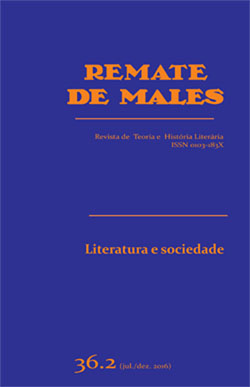Resumo
Esse artigo traz uma leitura do ciclo de contos Monção (1963) da escritora goesa Vimala Devi. Esse gênero literário permite ao autor dar visibilidade ao que Deleuze e Guattari (1975) chamam de literaturas menores: literaturas de comunidades minoritárias, mas escritas em línguas canônicas, neste caso a literatura de Goa em língua portuguesa. Logo, nos passos de Homi Bhabha (1994) os contos desta antologia são lidos em termos do conceito de momentos de estranhamento quando, de uma perspectiva crítica a autora desconstrói a ideia de Goa ser um local sossegado e problematiza questões sociais que mantiveram sua comunidade estagnada por tanto tempo.
Referências
ANANTAMURTHY, Udupi Rajagopalacharya. “Literature in the Indian Bhashas: Front Yards and Backyards”. In: Indian English and ‘Vernacular’ India. Makarand Paranjape & G. J. V. Prasad, eds. Delhi, Chennai, Chandigarth: Pearson, 2010.
BHABHA, Homi. Introduction. The Location of Culture. London: Routledge, 1994.
BOEHMER, Elleke. Colonial and Postcolonial Literature. Migrant Metaphors. Oxford: Oxford University Press, 2005.
BRUNER, Jerome. (2002) “Os usos das histórias”. In: Fabricando Histórias. Direito, Literatura, Vida.Trad. Fernando L Cássio. São Paulo: Letraevoz, 2014.
CHATERJEE, Partha. “The Nation and its Fragments. Colonial and Postocolonial Histories” In: The Partha Chaterjee Omnibus. New Delhi: Oxford University Press, 1993/1999.
DAS, Kumar Sisir. A History of Indian Literature. 1800-1910. Delhi: South Asia Books, 1991.
DELEUZE, Gilles; GUATTARI, Félix. Kafka. Por uma literatura menor. Rio de Janeiro: Imago Editora Limitada, 1975.
De SEABRA, Manuel. Prefácio. Os Javalis de Codval. Epitácio Pais. Lisboa: Editorial Futura, 1973.
DEVI, Vimala. (1963) Monção. Lisboa: Escritor, 2003.
DEVI, Vímala. Súria. Poemas. Lisboa: Agência Geral do Ultramar, 1961.
DEVI, Vimala; de SEABRA, Manuel. A Literatura Indo-Portuguesa. Lisboa: Junta de Investigações do Ultramar, 1971.
EAGLETON, Terry. “James Joyce”. In: The English Novel. An Introduction. London: Blackwell Publishing, 2005.
GUPTA, Charu. Sexuality, Obscenity, Community. London: Palgrave Macmillan, 2002.
GUPTA, Ginika. “Monção: Calibrations and Decolonizing Mood”. In: Act27. Goa Portuguesa e Pós-Colonial. Org. Everton Machado e Duarte D. Braga. V. N. Famalicão, Portugal, 2014, pp. 295-308.
JACKSON, Elizabeth. Feminism and Contemporary Indian Women’s Writing. London: Palgrave Macmillan, 2010.
MACHADO, Everton V. “Goa na Literatura Indo-Portuguesa”. In: Via Atlântica. Departamento de Letras Clássicas e Vernáculas, USP, São Paulo, n. 19, 2011.
MELO E CASTRO, Paul. “Vimala Devi’s Monção. The Last Snapshots of Colonial Goa”. In: Portuguese Studies, vol. 25 n. 1, 2009, pp. 46-64.
NUSSBAUM, Martha Craven. Women and Human Development. The Capabilities Approach. Chicago: The University of Chicago Press, 2001.
PRATT, Mary Louis. “The Short Story. The Long and the Short of It”. In: The New Short Story Theories. Charles May, ed. Athens, Ohio: Ohio U. Press, 1994.
STONE, Lawrence. “The Companionate Marriage”. In: The Family, Sex and Marriage in England, 1500-1800. London: Penguin, 1979.
WIEMANN, Dirk. “What Will Count as the World? Indian Short Story Cycles and the Question of Genre”. In: Locating Postcolonial Genres. Walter Goebel & Saskia Schabio, eds. New York & London: Routledge, 2013.
ZAGARELL, Sandra A. “Narrative of Community: The Identification of a Genre”. In: Signs: Journal of Women and Culture in Society 13.3, 1988, pp. 498-527.

O periódico Remate de Males utiliza a licença do Creative Commons (CC), preservando assim, a integridade dos artigos em ambiente de acesso aberto.

